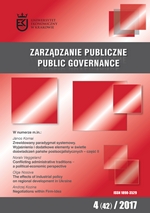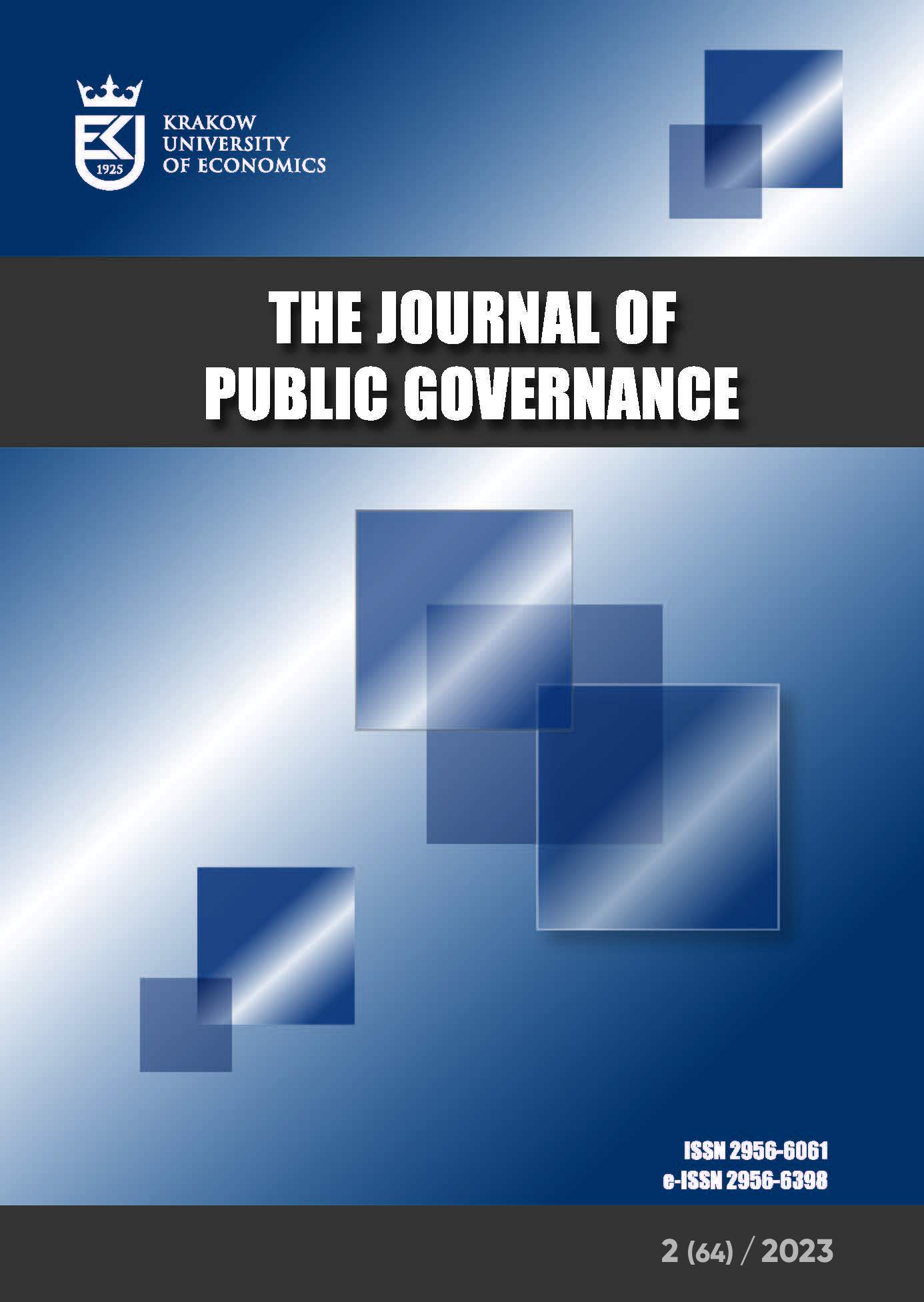Conflicting administrative traditions – a political-economic perspective
DOI:
https://doi.org/10.15678/ZP.2017.42.4.02Keywords:
trilemma, administrative traditions, trade-offs, European integration, interdependence, social networkAbstract
The term paradigm was introduced to the philosophy of science by Thomas Kuhn – he used this term to denote the specific approach applied by a school of research to examine its subject matter. Using the same paradigm, researchers seek answers to similar questions, and employ similar methods and concepts. In an article published in 2000, the author of this essay introduced the term system paradigm, which focuses on the systems functioning in a society. This study develops the theoretical considerations outlined in that earlier article on the basis of experience of post-socialist transition.
The first part compares the socialist and capitalist systems, describing their main characteristics, and concludes that the capitalist system has become established in former socialist countries, except for North Korea and Cuba. The second part analyzes varieties of capitalism within a typology which classifies prevailing forms of politics and government. Three markedly different types are identified: democracy, autocracy, and dictatorship. Huntington wrote about the “third wave” of democratization. This study concludes the third wave has dried up: for the 47 postsocialist countries, only a tenth of the population live in democracies, while autocracy or dictatorship prevails in all other countries in this group. The third part of this essay applies the conceptual and analytical apparatus to Hungary, where capitalism exists, and autocracy is the prevailing politico-governmental form – here we can find important characteristics common to other capitalist countries or other autocracies. This finding is compatible with the observation that there are some less fundamental characteristics unique to Hungary, or “Hungarica”, which differ from the characteristics of all other countries.
Downloads
References
Anderson, P. (1994). The invention of the region, 1945–1990. Florence: EUI Working Paper EUF 94(2).
Austvik, O.G. (2002). Internasjonal handel og økonomisk integrasjon. Oslo: Gyldendal Akademisk.
Austvik, O.G. (2003). Norwegian Natural Gas. Liberalization of the European Gas Market. Oslo: Europa-programmet.
Brunsson, N. (2011). The Organization of Hypocrisy. Copenhagen: Liber.
Castells, M. (1996). The Rise of the Network Society. Oxford: Blackwell.
Cini, M. (ed.) (2004). European Union Politics. Oxford: Oxford University Press.
Cini, M. (2004). Intergovernmentalism. In M. Cini (ed.), European Union Politics. Oxford: Oxford University Press.
Dahl-Eriksen, T. (1997). Suverene stater og transnasjonale regioner. HiF-rapport No. 6//1997, Alta.
de Buck, P. (2004). The social dialogue and the role of social partners in the EEA, EFTA Bulletin. Brussels: EFTA, 73–78.
EPC Working Paper (2005). The Nordic Model: A Recipe for European Success? European Policy Centre, Working Paper (20) 2005.
Europe’s World. The Only Europe-wide Policy Journal. Autumn 2005.
Haas, E.B. (1958). The Uniting of Europe: Political, Social and Economic Forces – 1950–1957. Stanford, CA: Stanford University Press.
Hoffmann, S. (1996). Obstinate or obsolete? The fate of the nation-state and the case of Western Europe. Daedalus, 95 (3), 862–915.
Iversen, T. (2005). Capitalism. Democracy and Welfare. Cambridge: Cambridge University Press.
Janssen, D. (2005). Retreat or relaunch: Choices for the Lisbon agenda. The Only Europe-wide Policy Journal, Autumn 2005, 54–57.
Keating, M., Loughlin, J. (eds.) (1997). The Political Economy of Regionalism. London: Frank Cass.
Keohane, R.O., Nye, J.S. (1977). Power and Independence: World Politics in Transition. Boston: Little Brown and Company.
Knill, Ch. (2001). The Europeanization of the National Administrations. Cambridge: Cambridge University Press.
Koukiadis, I.D. (2006). The Imminent Retirement of Socialism and the Hope of a New Social State. Athens: The Epitheorisi Ergasiakon Scheseon.
Krasner, S. (1983). Structural causes and regime consequences, regimes as intervening variables. In S. Krasner (ed.), International Regimes. London: Cornell University Press.
March, J., Olsen, J.P. (2005). The Institutional dynamics of international political order, Arena Working Papers 98/5. Oslo: University of Oslo.
Mayhew, A. (2005). Lisbon’s single size doesn’t fit all. Europe’s World, Autumn 2005.
Millward, A.S. (2000). The European Rescue of the Nation-State. London: Routledge.
Moravcsik, A. (1993). Preferences and power in the European Community: A liberal intergovernmentalist approach. Journal of Common Market Studies, 2 (2), 226–249.
Moravcsik, A. (1998). The Choice of Europe. Social Purpose and State Power from Messina to Maastricht. London: University College London Press.
Nuget, N., Paterson, W. (2003). The political system of the European Union. In J. Hayward, A. Menon (eds), Governing Europe (pp. 92–109). Oxford: Oxford University Press.
Nye, J.S. (1971). Comparing common markets: A revised neo-functional model. In L.N. Lindberg, S.A. Scheingold (eds), Regional Integration: Theory and Research. Cambridge: Cambridge University Press.
Nye, J.S. (2004). Soft Power: The Means to Success in World Politics. New York: Public Affairs.
OECD (2002). Distributed Public Governance. Agencies, Authorities and other Government Bodies. Paris: OECD Publishing.
OECD (2005). Modernising Government. The Way Forward. Paris: OECD Publishing.
Olsen, J.P. (2004). Europeanization. In M. Cini (ed.), European Union Politics (pp. 333–348). Oxford: Oxford University Press.
Olsen, J.P. (2005). Maybe it is time to rediscover bureaucracy? Working Paper 10. Arena University of Oslo.
Pollack, M.A. (2005). Theorizing EU policy-making. In H. Wallace, W. Wallace, M.A. Polack (eds), Policy-Making in the European Union. Oxford: Oxford University Press.
Pollitt, C., Bouckaert, G. (2004). Public Management Reform. A Comparative Analysis. Oxford: Oxford University Press.
Rasmussen, N.P. (2005). What Lisbon has cached is political courage, Europe’s World. Autumn 2005.
Rosamond, B. (2000). Theories of European Integration. London: MacMillan Press.
Røvik, K.A. (2007). Translasjoner og Trender. Ideer som former det 21. århundrets organisasjon. Bergen: Fagbokforlaget.
Skancke, M. (2003). Fiscal policy and petroleum fund management in Norway. In J. Davis, R. Ossowski, A. Fedelino (eds.), Fiscal Policy Formulation and Implementation in Oil-producing Countries. Washington, DC: International Monetary Fund.
Strøby Jensen, C. (2004). Neo-functionalism. In M. Cini (ed.), European Union Politics (pp. 80–92). Oxford: Oxford University Press.
Sverdrup, U. (2007). Implementation. In P. Graziano, M.P. Vink (eds), Europeanization. New Research Agendas. Basingstoke: Palgrave MacMillan.
Taylor-Gooby, P. (ed.) (2004). New Risks, New Welfare. The Transformation of European Welfare State. Oxford: Oxford University Press.
Tinbergen, J. (1965). International Economic Integration. Amsterdam: Elsevier.
Urwin, D.W. (1996). The Community of Europe. The History of European Integration since 1945. London: Longman.
Veggeland, N. (2004). The Competitive Society. How Democratic and Effective? Kristiansand: Norwegian Academic Press.
Veggeland, N. (2005). Europapolitikk, innenrikspolitikk og kommunene. Oslo: Kommuneforlaget.
Veggeland, N. (2007). Paths of Public Innovation in the Global Age. Lessons from Scandinavia. Cheltenham, UK – Northampton, MA, USA: Edward Elgar.
Veggeland, N. (2013). Essays on Regulatory Governance. New York: Nova Science Publishers.
Veggeland, N. (ed.) (2016). The Current Nordic Welfare State Model. New York: Nova Science Publishers.
Veggeland, N. (2017). Invited editorial. The UK NPM reforms. European Scientific Journal, 13 (16).
Weaver, R.K. (1986). The politics of blame avoidance. Journal of Public Policy. 6 (4), 371–398.
Downloads
Published
How to Cite
Issue
Section
License
Open Access, licence: CC-BY 4.0




